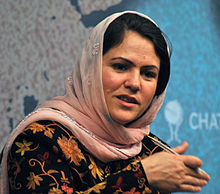Fausia Kufi

Fausia Kufi ( Persian فوزیه کوفی; born 1975 in Kowaf Ab in the province of Badachschan ) is an Afghan politician , women's rights activist and author . She is a member of the Afghan Parliament in Kabul and Vice-President of the National Assembly.
Family and youth
Fausia Kufi's father, the politician Abdul Rahman, had 23 children with seven wives, including several sons before Fausia was born. As a girl, Fausia was supposed to be put to death and exposed to the sun in the open air. Only when she was still screaming after a day did the mother think about it, bring her back inside and start raising her as a daughter. Even within the family, Fausia Kufi fought for her rights over her father and brothers. She was able to convince her parents to send her to school, then attended university, where she graduated with a Masters in Business and Management.
Professional career and political activity
After graduating from school, Fausia Kufi attended university, where she graduated with a master's degree in business and management. During the time of the Taliban rule in Afghanistan, she worked for the United Nations . Fausia Kufi's husband was tortured and died in prison in 2003.
She campaigns for the rights of women and criticizes the new guidelines for the behavior of women, which Hamid Karzai negotiated with the leaders of the Taliban in 2009, as a “green light for the Talibanization” of Afghan society. It said: "Men are of fundamental importance, women are subordinate." Men, for example, were allowed to beat their wives as long as it was in accordance with religious regulations. Armed men shot her after an International Women's Day event in 2010. She survived the attack and one of her bodyguards was injured.
She was considered a possible candidate for the presidency and challenger to Hamid Karzai. For the 2014 presidential election , however, the minimum age was raised to 40 years, so that she could not stand for election.
In 2019, she describes the political changes in Afghanistan since 2001 and the two groups of the Taliban, the liberal group that emerged in the negotiations and the radical military wing. The behavior towards women has become more extreme, especially in the younger generation of violent Talibans.
She survived an attack on her on August 14, 2020 on a highway north of Kabul, in which strangers shot her and her sister, with injuries to her hand. She is one of four women in the delegation scheduled for the 2020 negotiations with the Taliban to pacify Afghanistan. President Ashraf Ghani condemned the act in the strongest terms. The security authorities have started investigations, said the head of the delegation Mohammed Masum Staneksai . The Taliban rejected involvement in the attack.
Works
Her work Letters to My Daughters was first published in French by Michel Lafon Publishing and has been translated into several languages, including English , Italian , Spanish , Portuguese and Polish . The book grew out of the letters she wrote to her two daughters Shuhra and Shaharazad when she went away, worried that she might not return alive. In it she assured them that she was doing politics "so that you - my beloved daughters - are free to live your lives and dream your dreams".
In her autobiography Just a Daughter , which was published in English, Dutch and German , she describes the common domestic violence situations in her own family. The title of the book refers to the place Fausia Kufi had for the family when she was born .
Publications
- Letters to My Daughters. Douglas & Mcintyre Canada, 2011, ISBN 978-1-55365-876-4 (English) [ Lettres à mes filles , éditions Michel Lafon, 2011; French]
- Just a daughter. A woman is changing Afghanistan (translation: Anne Emmert). Goldmann Munich, 2012, ISBN 978-3-442-15745-7 .
Individual evidence
- ↑ a b c Hasnain Kazim: Presidential candidate Kufi. This woman wants to save Afghanistan . Spiegel Online , May 30, 2012, accessed October 25, 2017
- ↑ Fawzia Kofi on the website of the Afghan Parliament (Persian)
- ↑ a b c d e f David Pfeifer: Fausia Kufi. Courageous fighter for freedom in Afghanistan. In: Süddeutsche Zeitung, No. 195, August 25, 2020, p. 4. online , accessed on August 26, 2020
- ↑ a b Interview by Hasan Gökkaya in: Zeit online from September 13, 2019 , accessed on August 26, 2020
- ↑ a b o. V. (2020) Fausia Kufi: Well-known Afghan women's rights activist survived the attack. Spiegel, August 15, 2020. , accessed on August 26, 2020
- ↑ Agnes Tandler: The woman who could be dangerous to Karzai . Welt Online , March 22, 2012; accessed on October 24, 2017
- ↑ Matthias Gebauer, Shoib Najafizada: Women in Afghanistan Act regulates sexual relations with husbands . Spiegel Online , April 2, 2009, accessed October 24, 2017
- ↑ Fawzia Koofi, the female politician who wants to lead Afghanistan . In: New Statsman , December 18, 2013, accessed October 25, 2017
- ↑ ORF news agency from August 15, 2020 , accessed on August 26, 2020
- ↑ Letters to my daughters: a memoir: Koofi, Fawzia: Free Download, Borrow, and Streaming. Accessed August 26, 2020 (English).
- ↑ Armgard Seegers: Afghan presidential candidate Fausia Kufi: “Many of our politicians just want a standstill.” In: Hamburger Abendblatt , December 4, 2011, accessed on October 24, 2017
| personal data | |
|---|---|
| SURNAME | Kufi, Fausia |
| ALTERNATIVE NAMES | Fawzia Koofi; فوزیه کوفی |
| BRIEF DESCRIPTION | Afghan politician and women's rights activist |
| DATE OF BIRTH | 1975 |
| PLACE OF BIRTH | Badakhshan |